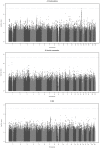No evidence for genome-wide interactions on plasma fibrinogen by smoking, alcohol consumption and body mass index: results from meta-analyses of 80,607 subjects
- PMID: 25551457
- PMCID: PMC4281156
- DOI: 10.1371/journal.pone.0111156
No evidence for genome-wide interactions on plasma fibrinogen by smoking, alcohol consumption and body mass index: results from meta-analyses of 80,607 subjects
Abstract
Plasma fibrinogen is an acute phase protein playing an important role in the blood coagulation cascade having strong associations with smoking, alcohol consumption and body mass index (BMI). Genome-wide association studies (GWAS) have identified a variety of gene regions associated with elevated plasma fibrinogen concentrations. However, little is yet known about how associations between environmental factors and fibrinogen might be modified by genetic variation. Therefore, we conducted large-scale meta-analyses of genome-wide interaction studies to identify possible interactions of genetic variants and smoking status, alcohol consumption or BMI on fibrinogen concentration. The present study included 80,607 subjects of European ancestry from 22 studies. Genome-wide interaction analyses were performed separately in each study for about 2.6 million single nucleotide polymorphisms (SNPs) across the 22 autosomal chromosomes. For each SNP and risk factor, we performed a linear regression under an additive genetic model including an interaction term between SNP and risk factor. Interaction estimates were meta-analysed using a fixed-effects model. No genome-wide significant interaction with smoking status, alcohol consumption or BMI was observed in the meta-analyses. The most suggestive interaction was found for smoking and rs10519203, located in the LOC123688 region on chromosome 15, with a p value of 6.2 × 10(-8). This large genome-wide interaction study including 80,607 participants found no strong evidence of interaction between genetic variants and smoking status, alcohol consumption or BMI on fibrinogen concentrations. Further studies are needed to yield deeper insight in the interplay between environmental factors and gene variants on the regulation of fibrinogen concentrations.
Conflict of interest statement
Figures


Similar articles
-
Genome-Wide Interaction Analyses between Genetic Variants and Alcohol Consumption and Smoking for Risk of Colorectal Cancer.PLoS Genet. 2016 Oct 10;12(10):e1006296. doi: 10.1371/journal.pgen.1006296. eCollection 2016 Oct. PLoS Genet. 2016. PMID: 27723779 Free PMC article.
-
Gene-environment interaction study for BMI reveals interactions between genetic factors and physical activity, alcohol consumption and socioeconomic status.PLoS Genet. 2017 Sep 5;13(9):e1006977. doi: 10.1371/journal.pgen.1006977. eCollection 2017 Sep. PLoS Genet. 2017. PMID: 28873402 Free PMC article.
-
The association of cigarette smoking and alcohol drinking with body mass index: a cross-sectional, population-based study among Chinese adult male twins.BMC Public Health. 2016 Apr 11;16:311. doi: 10.1186/s12889-016-2967-3. BMC Public Health. 2016. PMID: 27068329 Free PMC article.
-
Smoking, alcohol consumption, and cancer: A mendelian randomisation study in UK Biobank and international genetic consortia participants.PLoS Med. 2020 Jul 23;17(7):e1003178. doi: 10.1371/journal.pmed.1003178. eCollection 2020 Jul. PLoS Med. 2020. PMID: 32701947 Free PMC article.
-
Genetics of smoking behaviour.Curr Top Behav Neurosci. 2015;23:19-36. doi: 10.1007/978-3-319-13665-3_2. Curr Top Behav Neurosci. 2015. PMID: 25655886 Review.
Cited by
-
The association of alcohol with circulating total fibrinogen and plasma clot density is mediated by fibrinogen and FXIII genotypes.Thromb J. 2020 Nov 30;18(1):35. doi: 10.1186/s12959-020-00249-4. Thromb J. 2020. PMID: 33292263 Free PMC article.
-
Do prenatal factors shape the risk for dementia?: A systematic review of the epidemiological evidence for the prenatal origins of dementia.Soc Psychiatry Psychiatr Epidemiol. 2025 May;60(5):977-991. doi: 10.1007/s00127-023-02471-7. Epub 2023 Apr 8. Soc Psychiatry Psychiatr Epidemiol. 2025. PMID: 37029828 Free PMC article.
-
Anti-inflammatory potential of cannabidiol (CBD) on combination of caecal slurry, LPS, and E. coli-induced systemic inflammatory response syndrome (SIRS) in Sprague Dawley Rats.Inflammopharmacology. 2022 Feb;30(1):225-232. doi: 10.1007/s10787-021-00901-z. Epub 2022 Jan 8. Inflammopharmacology. 2022. PMID: 34997430
-
Quantile-specific heritability of plasma fibrinogen concentrations.PLoS One. 2022 Jan 7;17(1):e0262395. doi: 10.1371/journal.pone.0262395. eCollection 2022. PLoS One. 2022. PMID: 34995330 Free PMC article.
-
A meta-analysis of 120 246 individuals identifies 18 new loci for fibrinogen concentration.Hum Mol Genet. 2016 Jan 15;25(2):358-70. doi: 10.1093/hmg/ddv454. Epub 2015 Nov 10. Hum Mol Genet. 2016. PMID: 26561523 Free PMC article.
References
-
- Krobot K, Hense HW, Cremer P, Eberle E, Keil U (1992) Determinants of plasma fibrinogen: relation to body weight, waist-to-hip ratio, smoking, alcohol, age, and sex. Results from the second MONICA Augsburg survey 1989–1990. Arterioscler Thromb 12:780–788. - PubMed
-
- Folsom AR (1995) Epidemiology of fibrinogen. Eur Heart J 16 Suppl A: 21–23. - PubMed
-
- Cushman M, Yanez D, Psaty BM, Fried LP, Heiss G, et al. (1996) Association of fibrinogen and coagulation factors VII and VIII with cardiovascular risk factors in the elderly: the Cardiovascular Health Study. Cardiovascular Health Study Investigators. Am J Epidemiol 143:665–676. - PubMed
-
- Burger M, Mensink G, Bronstrup A, Thierfelder W, Pietrzik K (2004) Alcohol consumption and its relation to cardiovascular risk factors in Germany. Eur J Clin Nutr 58:605–614. - PubMed
-
- Wannamethee SG, Lowe GD, Shaper AG, Rumley A, Lennon L, et al. (2005) Associations between cigarette smoking, pipe/cigar smoking, and smoking cessation, and haemostatic and inflammatory markers for cardiovascular disease. Eur Heart J 26:1765–1773. - PubMed
Publication types
MeSH terms
Substances
Grants and funding
LinkOut - more resources
Full Text Sources
Other Literature Sources
Medical

